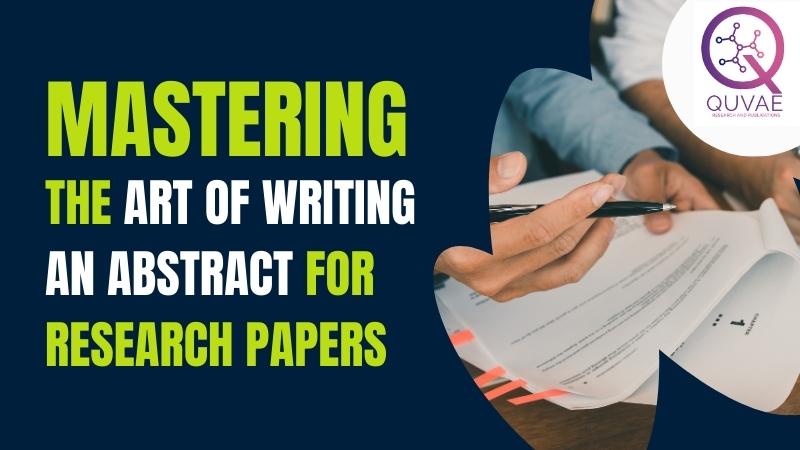As an aspiring researcher, you may have spent months or even years working on your research project. You have read countless articles, conducted experiments, collected data, and analyzed the results. Now, it is time to share your findings with the world. One of the first steps in doing so is writing an abstract for your manuscript. Here we can know about the mastering the art of writing an abstract for research papers.
An abstract is a short summary of your research, usually between 150 and 250 words. It is the first thing that readers will see, and it can determine whether or not they will continue reading your paper. Therefore, it is important to master the art of writing an abstract.
Mastering the Art of Writing an Abstract for Research Papers
In this article, we will guide you through writing an abstract for your research manuscript. We will cover what an abstract is, why it is essential, and how to write an effective abstract.
What is an Abstract?
An abstract briefly summarizes your research paper that provides an overview of the research question, methods, results, and conclusions. It is usually placed at the beginning of the paper, before the introduction.
The purpose of an abstract is to give readers a quick and clear understanding of your research paper. It should be concise, informative, and well-written. An abstract should be able to stand alone, meaning that it should make sense even if the reader does not read the entire paper.

Why is an Abstract Important?
An abstract is important for several reasons. Firstly, it helps readers decide whether or not they want to read your paper. If your abstract is poorly written, readers may assume that your paper is also poorly written and not worth their time.
Secondly, an abstract helps researchers find articles that are relevant to their research. It allows them to quickly scan through a large number of articles to find the ones that are most relevant to their research question.
Finally, an abstract can also be used by researchers to present their research at conferences or to apply for research grants. In these cases, the abstract is often the only part of the paper that is read, so it is important to make it as clear and informative as possible.
How to Write an Effective Abstract?
Now that you know what an abstract is and why it is important, let’s look at how to write an effective abstract. Here are some tips to help you master the art of writing an abstract:
1. Start with a Hook
Your abstract should start with a hook that grabs the reader’s attention. This could be a surprising fact, a provocative statement, or a question that your research answers. The hook should be relevant to your research and should make the reader want to learn more.
2. State the Problem
The next step is to state the problem that your research addresses. This should be a clear and concise statement of the research question that you are trying to answer.
3. Describe the Methods
After stating the problem, describe the methods you used to answer the research question. This should include a brief description of the study design, the sample size, and the data collection methods.
4. Summarize the Results
Next, you should summarize the results of your study. This should be a brief overview of the main findings of your research. You should avoid going into too much detail at this stage, as this will be covered in the main body of the paper.
5. Conclude with Implications
Finally, you should conclude your abstract by stating the implications of your research. This should be a brief statement of the significance of your findings and how they contribute to the field of study.
In addition to these tips, there are other things to remember when writing an abstract. Firstly, use clear and concise language. Avoid using jargon or technical terms that may be unfamiliar to your readers.
Secondly, be honest about your findings. Don’t exaggerate or make claims that are not supported by your data. This will only undermine the credibility of your research.
Finally, proofread your abstract carefully. Make sure that it is free from errors and that it is well-written of how to avoid plagiarism in research paper.
Conclusion
Writing an abstract for your research paper is an important and sometimes challenging task. However, with the right approach, you can master the art of writing an effective abstract. Remember to start with a hook, state the problem, describe the methods, summarize the results, and conclude with implications. Use clear and concise language, be honest about your findings, and proofread carefully. By following these tips, you can write an abstract that will grab the reader’s attention and make them want to learn more about your research.

